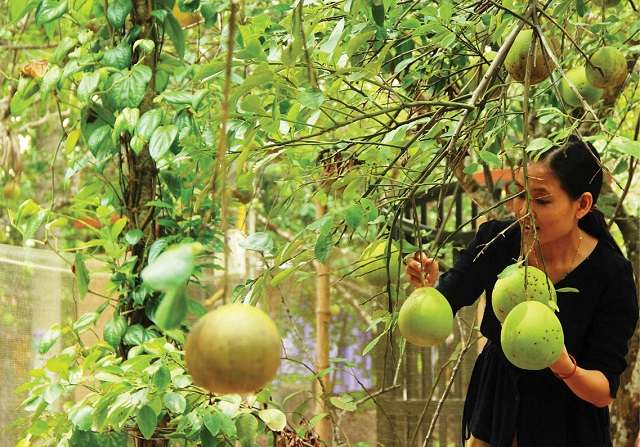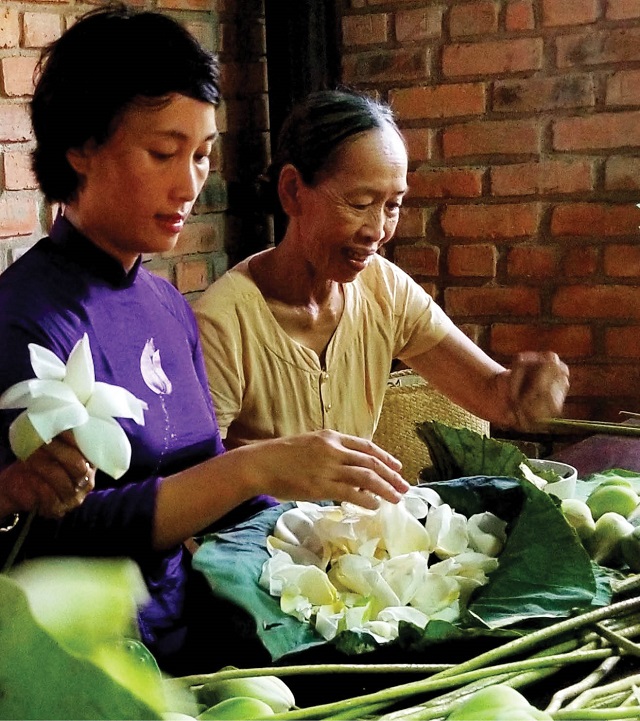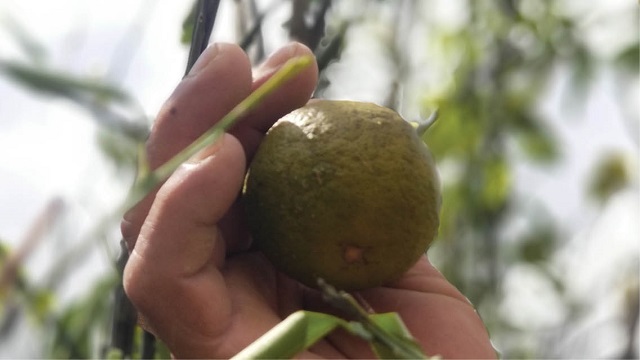The fragrant lotus seasons. Photo: Trung Phan
Believing in the greens
Agricultural tourism is a trend and Hue is not absent from that flow. Mr. Nguyen Xuan Hoa, the researcher, once stated that it would be the right direction for Hue to develop clean agriculture combined with tourism, especially based on the advantages of traditional trees as the foundation.
"Hue is a unique land unlike others. When mentioning longan, Huong Can mandarin, Thuy Bieu pomelo or Hue lotus, people will immediately associate them with royal dishes,” Mr. Hoa shared.
It is the alluvium of the rivers that contributes to the reputation of Hue special fruits. Huong Can mandarin “thrives” thanks to alluvium of the Bo River. The fertile soil gives them a “breathtaking” aroma. They are said to be as delicious as the mandarin of Giang Lang (Jiangnan) of China. Similarly, the Huong River has made Thuy Bieu pomelo one of the most delicious fruits in Vietnam.
And it is not a coincidence that Truoi mulberries entered the song: "In the past, my mother told me / To choose the fairy mulberries from Truoi / For his family come to speak out"...

Thuy Bieu pomelo - one of the most delicious fruits in Vietnam
A Vietnamese expat friend of mine after visiting a Thuy Bieu pomelo garden said that if he returns to Vietnam, he will buy a pomelo garden along the Huong River and build a small homestay to welcome tourists to experience the garden with the heritage river.
Guests coming to his homestay would enjoy the pomelo, experience Hue delicacies and indulge in the poetic Huong River. Above all, there will be Hue people telling the history of the pomelo and the ancient capital land.
Hue weather is changeable, so the way these fruit trees survive and endure is no different from the local people. In 2020, a series of natural disasters brought many gardens to ruin, submerged in the floods. The local farmers have had to face many difficulties.
Mr. Ho Dang Lao (Huong Toan commune, Huong Tra town), in addition to farming, has had a lifetime taking care of his Huong Can mandarin trees. He does it not only for livelihoods but also for the culture of the whole land. Storm and flood passed, but in the ruined garden, the old mandarin root still stood firm. Although he sighed loudly, he was not too sad because the green color was still present.
“As for the old mandarin, there are still genetic resources. From these stumps, the garden will be green again. The famous mandarin will not be lost”, Mr. Lao said optimistically.
Mr. Chau Ngoc Phi, Director of the Provincial Agricultural Extension Center, said: “Storms and floods caused damage to many Hue specialty crops, especially the mandarin. We have been working with local agricultural experts to help farmers recover. Historically, these gardens have experienced many floods and were also damaged, but we have always determined that these are historical varieties so that at all costs must be restored.
Preserving precious genes
Hue's specialty indigenous varieties have in them the dream of the land, the dream of enriching the honest and rustic people. “From Huong Can mandarin, a few seasons ago, I earned 80 million VND/crop. If the variety is well preserved, and multiplied, it will surely bring a high income”, Mr. Lao said.

Hue lotus is creating livelihoods for local people
Like other lands, indigenous flora in Hue has been grown for a long time in the localities. They have adapted for a long time through natural and artificial selection. Cultural sediments, features of the land, and living conditions make many native plants and trees unique to Hue.
Agronomist, Dr. Le Tien Dung has spent a lifetime researching agriculture. Although Hue is not the place where he was born, the specialty fruit trees have kept him here.
“Hue's specialty crops can be grown in other lands, but the value will not be equal and the quality not as high. Hue has the advantage of being a place where the variety was "born", so it must be kept," Mr. Dung affirmed. He then suggested: "The pomelo being grown on a large scale is the main economic development direction of some localities, but in addition to the economic factor, people need to consider the plan to conserve the original, indigenous genetic resources, as a highlight and foundation to develop other things such as culture and tourism”.

Huong Can mandarin – a fruit of history
"It is no coincidence that over a long period of time, these special varieties have not disappeared, because they have been attached to Hue as "flesh and blood ". Therefore, conservation of the gene pool not only is a scientist's job but also depends on people's awareness,” said Associate Professor, Dr. Phan Thi Phuong Nhi, Deputy Head of the Faculty of Agriculture, University of Agriculture and Forestry, Hue University.
Preservation of top varieties is the first solution Dr. Nhi suggested in order to promote Hue specialty fruits. Basically, these best quality trees are still present in Hue and this is a valuable genetic source for multiplication.
Vietnam in general and Hue in particular have the diversity of topography, climate, and soil with many kinds of fruits. In the green scenery of Hue, there are historic gardens.
In a dialogue on agriculture, Ms. Nguyen Thi Thanh Thuc, Chairman of the Board of Directors of Bagico Company, Member of the Executive Committee of Vietnam Digital Agriculture Association suggested: “In order for the fruit trees to be green and sustainable, agricultural investment and branding cannot be spread out. A few specific indigenous products should first be emphasized. I recommend Hue agriculture to focus on developing lotus because this is a valuable crop. It is possible to make use of all the parts of the lotus: the leaves, silk, seeds, roots and buds. It is also because Hue lotus is an outstanding brand ".
Hue pomelo is creating highlights for tourism and livelihoods; Huong Can mandarin should be restored and even grown organically; from Hue lotus create unique gifts such as lotus tea and lotus wine; Truoi mulberries are still present in gardens. Hue has been staying green in that way, from the historic gardens.